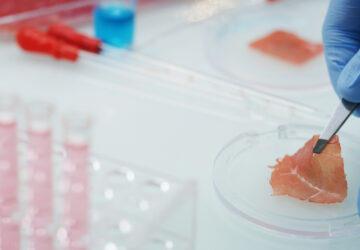 Mark Bittman, The New York Times’ resident holier-than-thou food columnist, economic illiterate, and sugar-prohibitionist gastronome, is at it again. After condemning sugared drinks (when not peddling recipes for sugar syrup), pork (when not calling stuffed pork loin “a symbol of winter to me”) and ground beef (when not enjoying odd cuts of the cow), Bittman is now trashing dairy.
Mark Bittman, The New York Times’ resident holier-than-thou food columnist, economic illiterate, and sugar-prohibitionist gastronome, is at it again. After condemning sugared drinks (when not peddling recipes for sugar syrup), pork (when not calling stuffed pork loin “a symbol of winter to me”) and ground beef (when not enjoying odd cuts of the cow), Bittman is now trashing dairy.
His source for this new dis? Neal Barnard, head vegan of the so-called “Physicians Committee” for “Responsible Medicine” (now claiming ten percent actual doctors). Lest one forget Barnard’s history with dairy, this non-practicing psychiatrist called cheese “dairy crack” and his organization tried to put warning labels on every milk carton in Washington, D.C. He’s not exactly a credible source.
Apparently, Bittman’s heartburn went away when he and a friend dropped milk from their diets. Never mind that another of Bittman’s friends’ heartburn was not resolved by that decision, but let’s not allow real science to get in the way of a clever story. (And remember: the plural of “anecdote” is not “data.”)
Of course, that wouldn’t be the first time a claim against milk based on weak evidence didn’t stand up to scrutiny. Contrary to the PCRM and PETA propaganda, milk can protect bone health.
Bittman’s personal changes haven’t stopped him from keeping the cheese in his recipes. If he wants to cut himself off from a rich culinary heritage—there are dozens of distinct cheeses alone—it’s Bittman’s right to do so. But Bittman said of New York Mayor Bloomberg’s soda ban:
And if you believe that limiting our “right” to purchase soda is a slippery slope, one that will lead to defining which foods are nutritious and which aren’t — and which ones government funds should be used to subsidize and which they shouldn’t — you’re right.
There is a difference between one’s personal dietary habits and suggestions and a mandatory government policy about what we can consume. So when Bittman is giving credence to animal rights activists who deem giving dairy products to kids “child abuse,” we cannot trust that he will not let his own preferences stand in the way of the rest of us continuing to participate in a rich culinary heritage.




